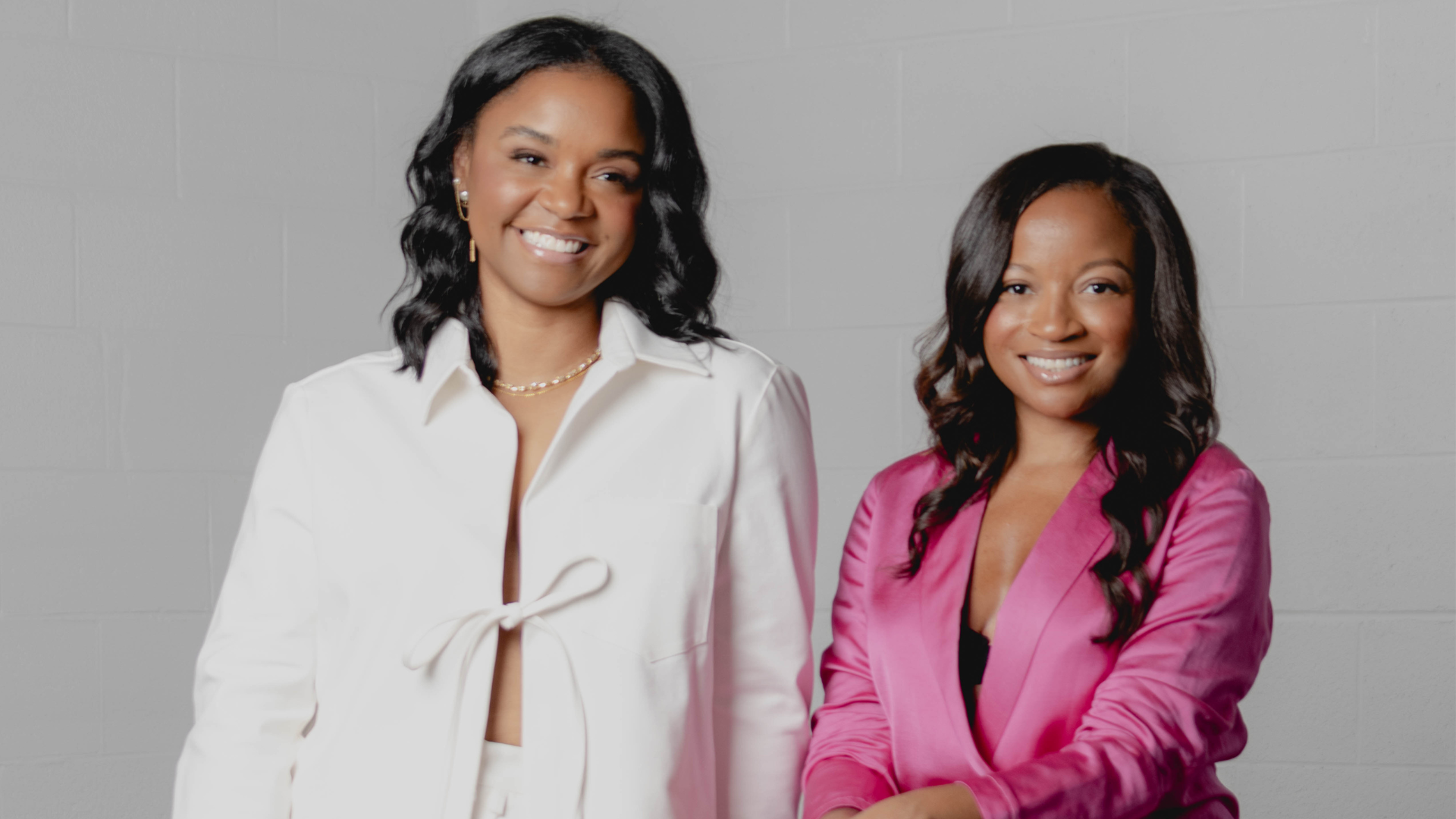
When Kimberly Selden and Virginia Thorton met for lunch in December 2021, little did they know that their conversation would snowball into a movement. The two family friends gathered at Esoteric, a restaurant in Virginia Beach to discuss their shared aspirations of launching and designing a hotel, then the discussion took an unexpected turn.
Over a video call, Selden and Thorton candidly express how a past conversation led to the creation of Black Girls Tennis Club, a charitable organization that serves as a pathway to liberation for Black women and girls through play. The former expressed that in that now-intentional banter, Kimberly says she’d seen a video of Virginia playing tennis on Instagram–she hadn’t known that this was a hobby of hers.
Living in New York City, Kimberly wanted to play more but felt it was difficult, namely because few people who looked like her played. The sentiment felt all too familiar to Virginia, but this conversation sparked the creation of BGTC.
Founded in March 2022, Black Girls Tennis Club is officially a 501(c)(3). With Wimbledon doubles’ champion Taylor Townsend on the board of directors, BGTC has provided countless community clinics across the nation, partnered with local historically Black college and university tennis teams, and had Zendaya step out in their merch. Engaging the club’s four key pillars of C.A.R.E: culture change, access, representation, and exposure—Kimberly and Virginia aim to reclaim, reshape, and shift the narrative surrounding the sport.
Evident in the record-breaking attendance at September’s U.S. Open, there’s a clear resurgence in the sport, and the profile of the “average tennis player” is changing. Despite the rich history of Black people in tennis, it has long been regarded as a white, elitist pastime, but the tide is surely turning. According to a March report from the United States Tennis Association in 2023, Black participation in tennis has increased by 46%.
Long before the Challengers craze and tennis-core fashion trends, Virginia state natives Selden and Thorton have been creating space for Black tennis players to find community. From Margaret and Matilda Peters and Althea Gibson to Serena Williams, Taylor Townsend, Coco Jones, and Alycia Parks, Black women have been contributing to the game—and Black Girls Tennis Club is making sure we always will be.
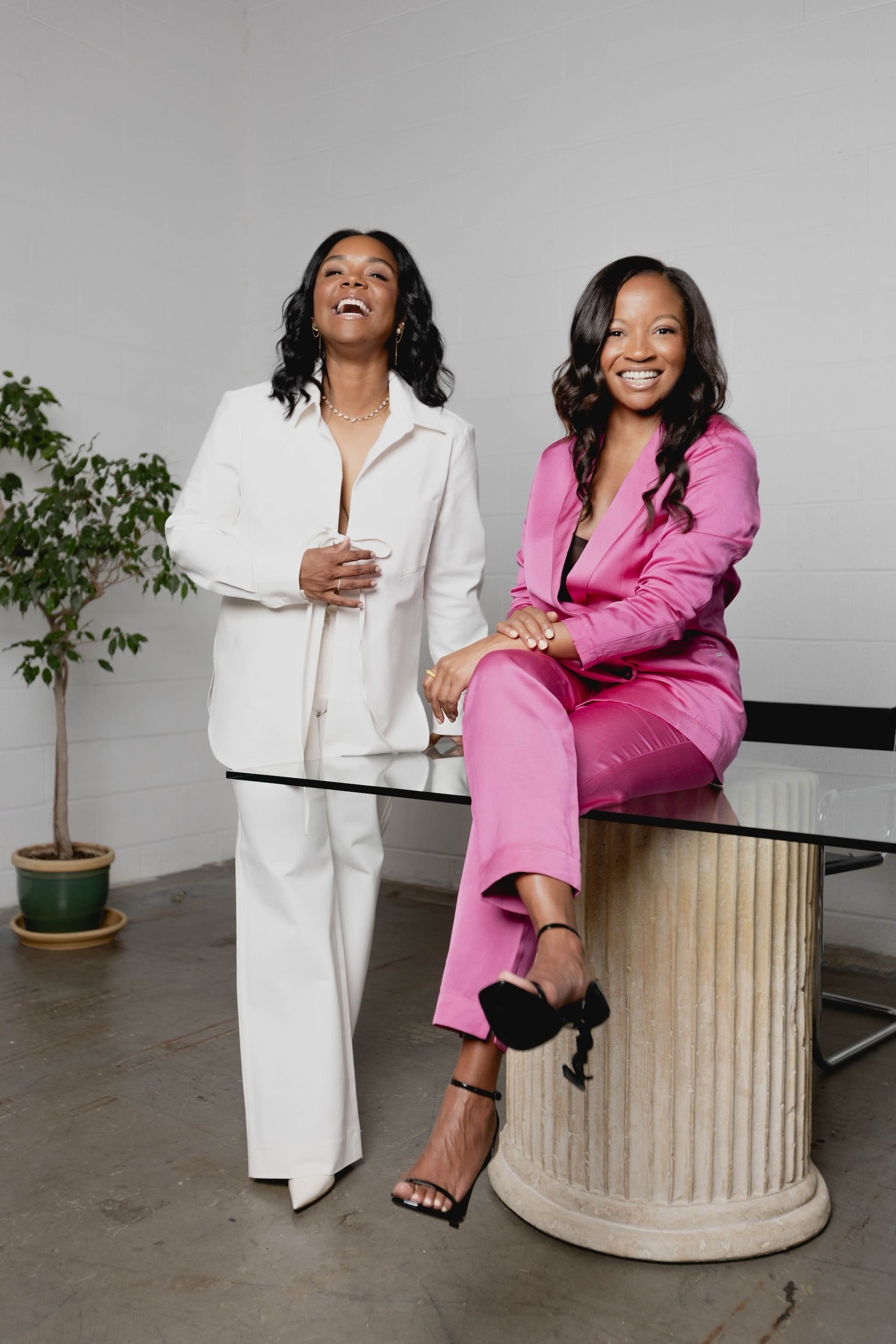
Kimberly, 39, started playing tennis as an adult at the onset of the COVID-19 pandemic, thanks to the socially-distant nature of the sport. Virginia, 37, began learning tennis from her father, alongside her brothers and mother, at the age of 10. For her, tennis is a core family memory.
Upon joining the Maury High School tennis team, Virginia remembers being intimidated. She was not only the newbie on a close-knit squad, but she was the only Black girl. Although she did not personally feel antagonized by her peers, myriad challenges came with being “the only one.” Virginia often felt othered and isolated and even remembers being pitted against a Black athlete on an opposing team. Through the culture the duo has built at Black Girls Tennis Club, Kimberly, and Virginia have sought to rectify that.
“It was just not being understood. [When you mention] sweating your hair out, but they have no idea what you’re talking about. Or me switching into Air Force Ones for my tennis picture. They’re just like, ‘What? Why are you doing that?’ Being able to facilitate this community offers us a space to be ourselves, let our hair down, use the lingo we want to use, and play the music we want to play when we’re hitting and warming up. I’ve noticed through BGTC that these young girls are different. They don’t care who they’re around. They’re themselves, and I love it,” Virginia said.
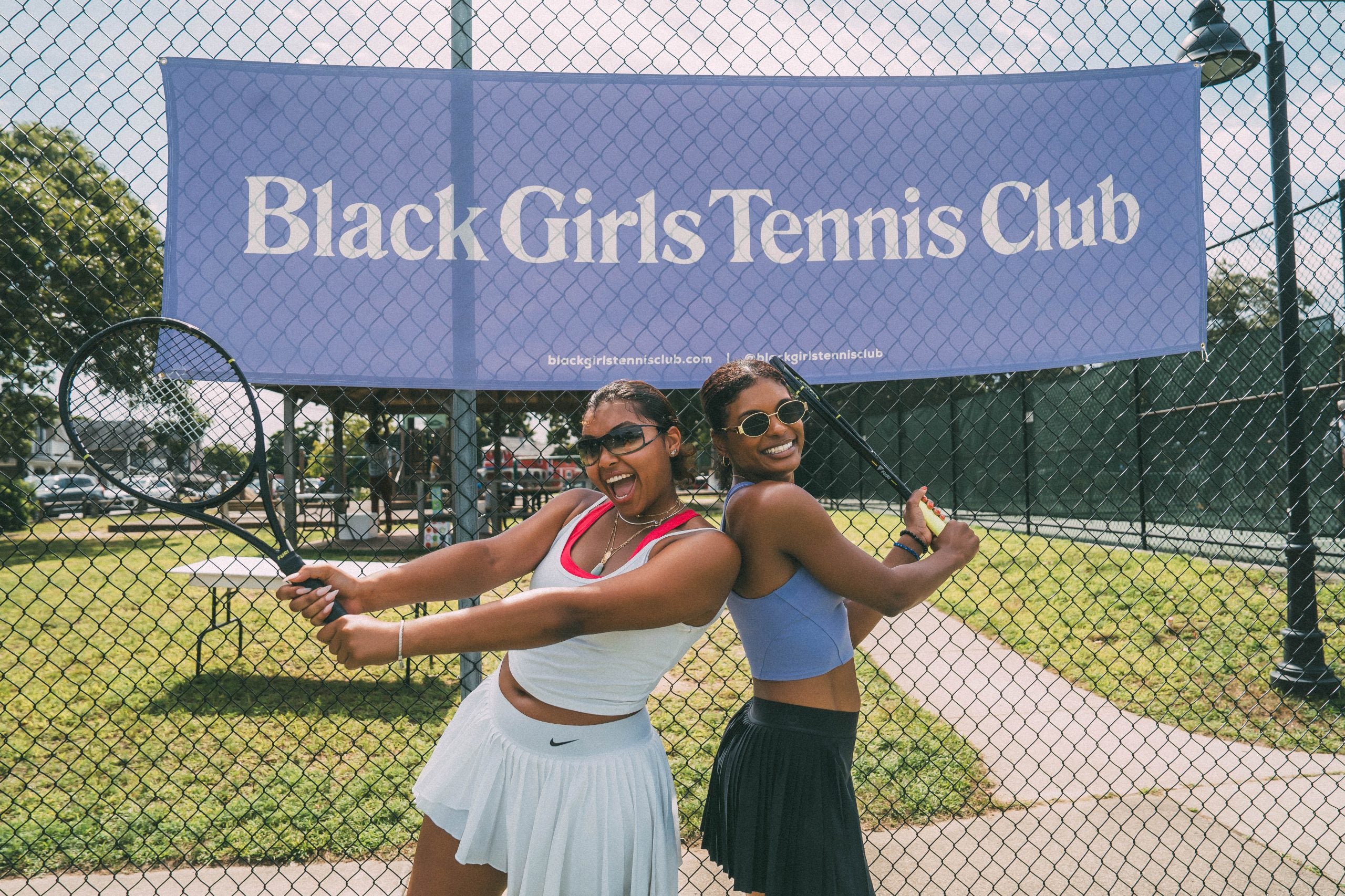
Selden said that the club launched its first-ever clinic in April 2022, with 10 youth attendees and Thorton’s childhood coach leading the session. Albeit apprehensive and fearful that the Black Girls Tennis Club would be whitewashed, the inaugural cohort of participants developed a close bond. Ultimately, two of them, who had never touched a tennis racquet prior, tried out for the roster of their school tennis teams. And they made it.
“That was a huge moment for us. We were like, ‘Okay, we’ve got to keep going like this. This is the real work,’” said Selden. “At first, I felt like we were just doing it for fun, then we started to see all the impact we could make and all the gaps in tennis and the tennis industry. We need to maximize this time with the girls, and that led us to building out a curriculum for the girls to focus on things like hair and nutrition, things that might be specific to them as Black girls. Eventually, we decided to expand to adult programming as well.”
Harkening back to the initial cohort, Kimberly shares that one of the biggest barriers to tennis besides race, wealth, and zip code are cultural misconceptions. To the naked eye, the sport’s lily-white facade is deeply pervasive. It extends from the out-of-reach luxury fashion brands associated with tennis, such as Lacoste and K-Swiss, to the stringent all-white dress code at Wimbledon. While tennis-core has reduced this to knitwear and preppy stripes, there is an inherent implication that tennis is reserved for society’s elite. Any form of self-expression that doesn’t conform to whiteness is perceived as restricted, thus alienating Black and brown players.
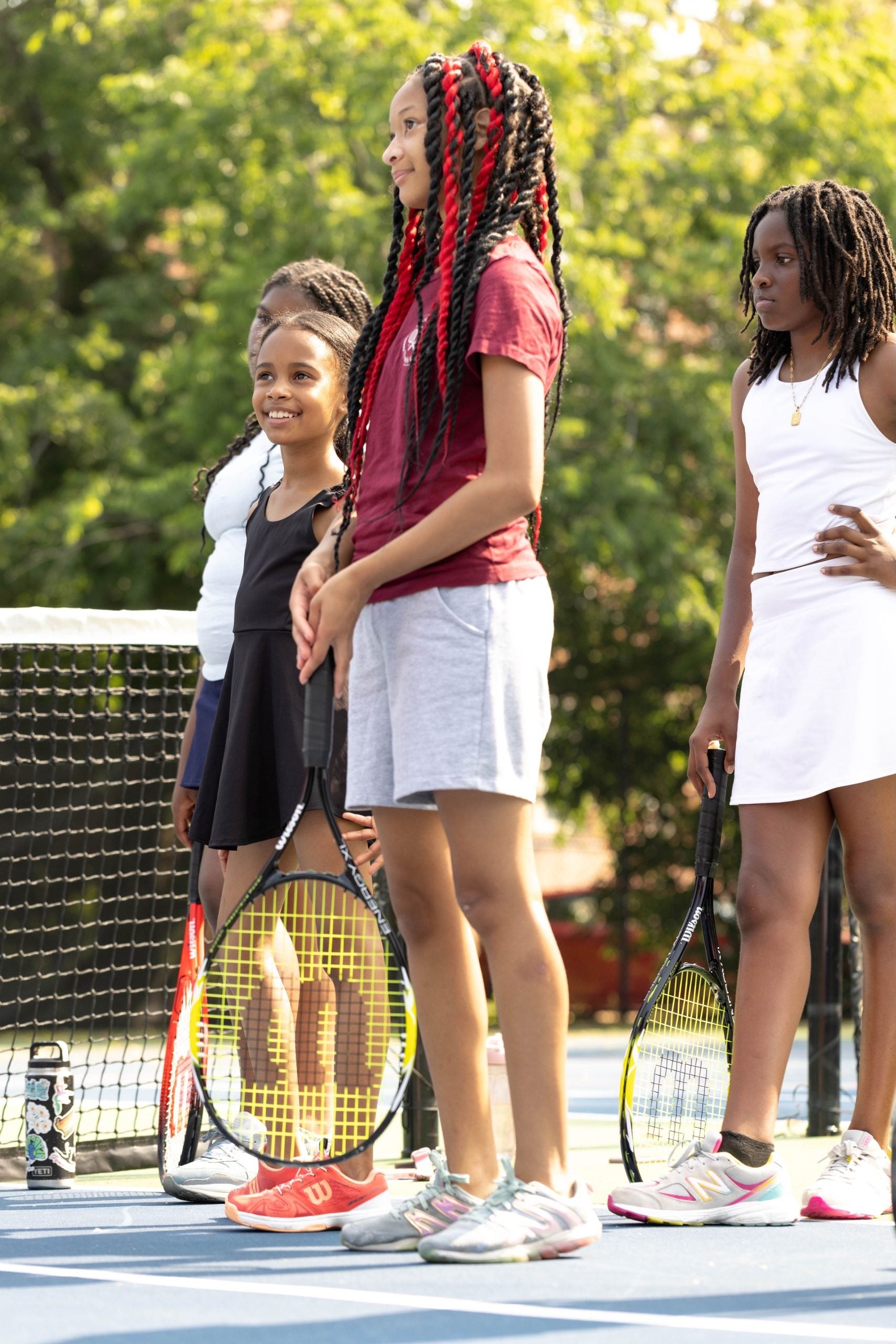
“Newcomers wonder, ‘Okay, this feels very stiff. Can we play music? Can we talk on the court?’” Kimberly pondered. Because of the messaging and imagery regarding tennis, participants were wary that Black Girls Tennis Club would be devoid of our culture.
Through BGTC’s pillars, the founders ensure that the organization creates fun environments that intentionally speak to the communities the club aims to serve. That means providing equipment, offering low-cost programming, or adding journaling and self-love curriculum for the younger girls. The co-founders also worked with the City of Norfolk’s local council to allocate funds to resurface courts—and have brought in some professional heavy hitters to further BGTC’s mission. In March, Kimberly met Taylor Townsend at California’s BNP Paribas Open, colloquially known as Indian Wells.
Kimberly notes that although she wasn’t prepared to pitch BGTC to Taylor, Townsend was immediately receptive. Taylor inquired about what was needed at the moment–and Kimberly shared that additional board members would be helpful. “That was a four to six-month courting process, and she signed her paperwork maybe one week before she won at Wimbledon.”
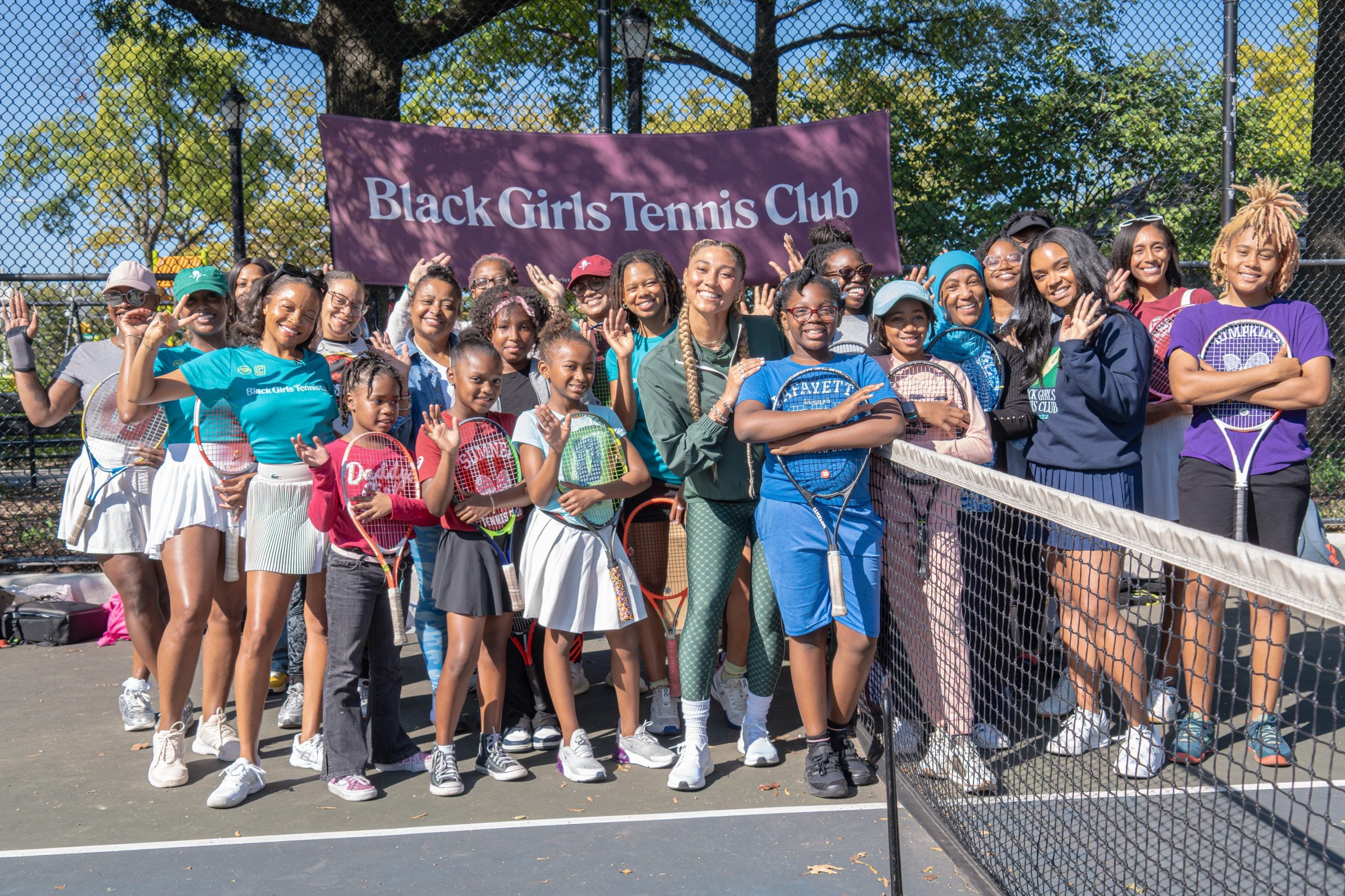
“Taylor represents Black Girls Tennis Club. She’s a mom. She has gone through so much on the court, [with] people criticizing her because of the way she looks. She shows up as her authentic self. She’s just a fun and dope individual,” Kimberly said. “She surprised our ladies at a clinic that we did in DC for City Open, then she surprised us again during the U.S. Open. She has a lot of big ideas, and I feel like she’s like the perfect advocate for what we’re trying to do.”
In the early years of her career, despite being the No.1 ranked junior in the world, Townsend was the subject of fatphobic criticism, and she was professionally sidelined as a result. As a 16-year-old from the South Side of Chicago, according to Townsend’s recollection in The Players’ Tribune, USTA leadership recommended that she undergo an “eight-week block of fitness training” to lose weight. “I was fat, and I was Black, so they took away my dream. Or at least they tried,” wrote the now-Wimbledon Champion.
Virginia echoed that institutions, namely the media, play a large role in shaping the perception of who should be allowed to partake in certain activities. “If I never played tennis and the only way that I see tennis is on TV, I’m going to think that 90% of tennis is skinny, white, preppy with a Rolex deal. Tennis doesn’t have one, singular look. That’s just what’s on TV,” she said.
Kimberly says that BGTC’s message is so much bigger than tennis and representation; it extends to decolonizing one’s mind, rethinking about who can access leisure and wellness—and why it can’t be us as Black women. While tennis is experiencing a renaissance in the zeitgeist, sparked by entertainment and fashion, something radical is happening for Black women, according to the co-founder.
She goes on to express that the pandemic forced many of us to take a long look at ourselves and figure out what matters. That included figuring out what makes us well and part of that is finding hobbies. “We’re trying to plant much bigger seeds, about radical wellness and joy, using tennis as a catalyst. I came up in a culture of ‘sleep when you die.’ We used to really value hustle culture, and now we value something different—and that means our lives need to look different.”
A principle of the club’s work is fostering community, but also providing a space for Black women to free themselves from perfectionism. Selden attested to the fact that learning tennis, immersing oneself in something that you’re not immediately good at, was a challenge. Through BGTC, she’s encouraged Black women to take ownership of their physical health, while also breaking down mental barriers.
“My main reason for playing tennis is my mental wellness,” Virginia declared at one point of our interview. She explained that though she loves the sport it at times feels better than an actual therapy session. “I just want other Black women and girls to experience that. Once you hit that sweet spot where you keep going and you’re like, ‘Wait, I’m a little bit good at this,’ you could eventually get to that.”
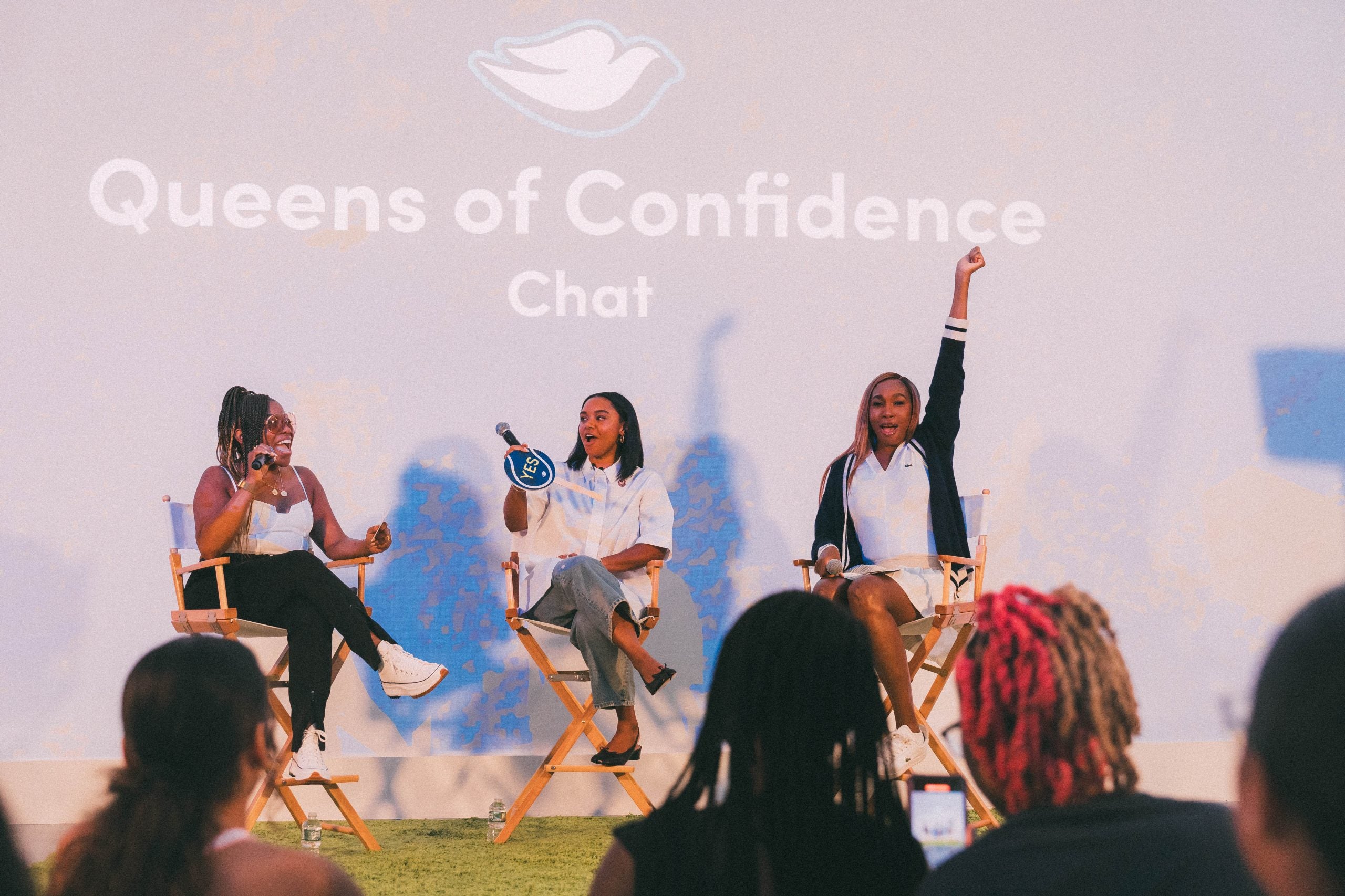
Their efforts have not been in vain. Black Girls Tennis Club has earned coverage on the TODAY Show as well as in the New York Times. The Club has earned grants from Microsoft, USTA, and the Women Sports Foundation—and garnered the attention of Challengers star Zendaya. Prior to the 2023 Hollywood writers and actors strike, MGM Studios publicist Tahajah Samuels reached out to the co-founders, requesting to collaborate with them ahead of the film’s release. Following the strike, Zendaya surprised Black Girls Tennis Club patrons at a screening of the film and sported a BGTC tote on her press tour.
“I had just seen the trailer for the movie,” Virginia recalls. “Kimberly and I were talking about it. It was that night, minutes after our conversation, that we got an email from MGM. We’re not going to question it. All of those moments just validate what we’re doing.”
Through film, Black Girls Tennis Club is now taking ownership of chronicling and honoring Black tennis history. Storytelling and content is a part of the culture change, according to Kimberly. As co-founders they aim to share those narratives. In August 2024, after two years of research and planning, the club traveled to Martha‘s Vineyard for a week of programming, hosting an inaugural event at Niantic Park in the historically Black Oak Bluffs.
When she first visited Martha’s Vineyard in 2022, Kimberly called Virginia immediately, raving about the number of Black women and girls she saw in tennis skirts. It was decided: Black Girls Tennis Club would be hosting a clinic there in the future. Much like the organization’s inception, Kimberly had no clue what would come of just a few conversations.
“We posted in a Facebook group looking for houses, and the Facebook group blew up,” Kimberly shared. She says they both were taken aback because they then began learning about tennis and how it is intrinsic to Martha’s Vineyard. The co-founder said they didn’t realize how much Black tennis history existed on the historic island. “Some of it’s just not captured, locally, and globally, professionally [or even] recreationally.”
From the Facebook group, the co-founders learned how much the community was yearning for tennis to return as pickleball encroached upon the court space. Selden and Thornton learned about now-defunct tennis competitions, such as the Oak Bluffs Tournament and the Mary Tucker Invitational, named for the lifelong civil rights activist and avid tennis player.
When Mary Tucker passed away in 2021, days shy of her 103rd birthday, the invitational died with her. Following approval from the city council, Black Girls Tennis Club was able to take the courts back. In preparation for the club’s arrival at the Vineyard, Kimberly and Virginia began speaking with Black elders, filming interviews with them, and eventually compiling a short documentary.
“I think us pursuing these stories really got us the approval from people that live there and are from there. We could have just showed up, did our thing, and not know anything about the history,” Kimberly said. She added that she feels that this positioned the organization to be inherent storytellers within the tennis space. The duo went to the house where Mary Tucker’s husband built a court that currently needs refurbishing. While there they also mapped plans to potentially work towards getting it resurfaced and bring back the Mary Tucker Invitational.
While on Martha’s Vineyard from August 9th to the 16th, Black Girls Tennis Club hosted a Play Day at Niantic Park, a brunch panel with Grantmakers for Girls of Color, and a holistic wellness-focused session in connection with Paramount’s Content for Challenge. Right now, the co-founders’ sights are set on continuing to film more Black tennis history on the Vineyard, launching BGTC events in DC, NYC, and Atlanta, and creating a membership program for people who are located in cities that the club hasn’t reached yet.
As the organization increases its visibility on and offline, the Black Girls Tennis Club co-founders are always looking for financial support and funding to adequately support their mission and expand their team. Black-led organizations, such as the Fearless Fund, are navigating a highly-politicized era, subject to extreme, regressive anti-DEI backlash. At the helm of one of the leading organizations diversifying tennis, Selden and Thornton are not dismayed. In fact, they say it gives them even more of a reason to keep going.
